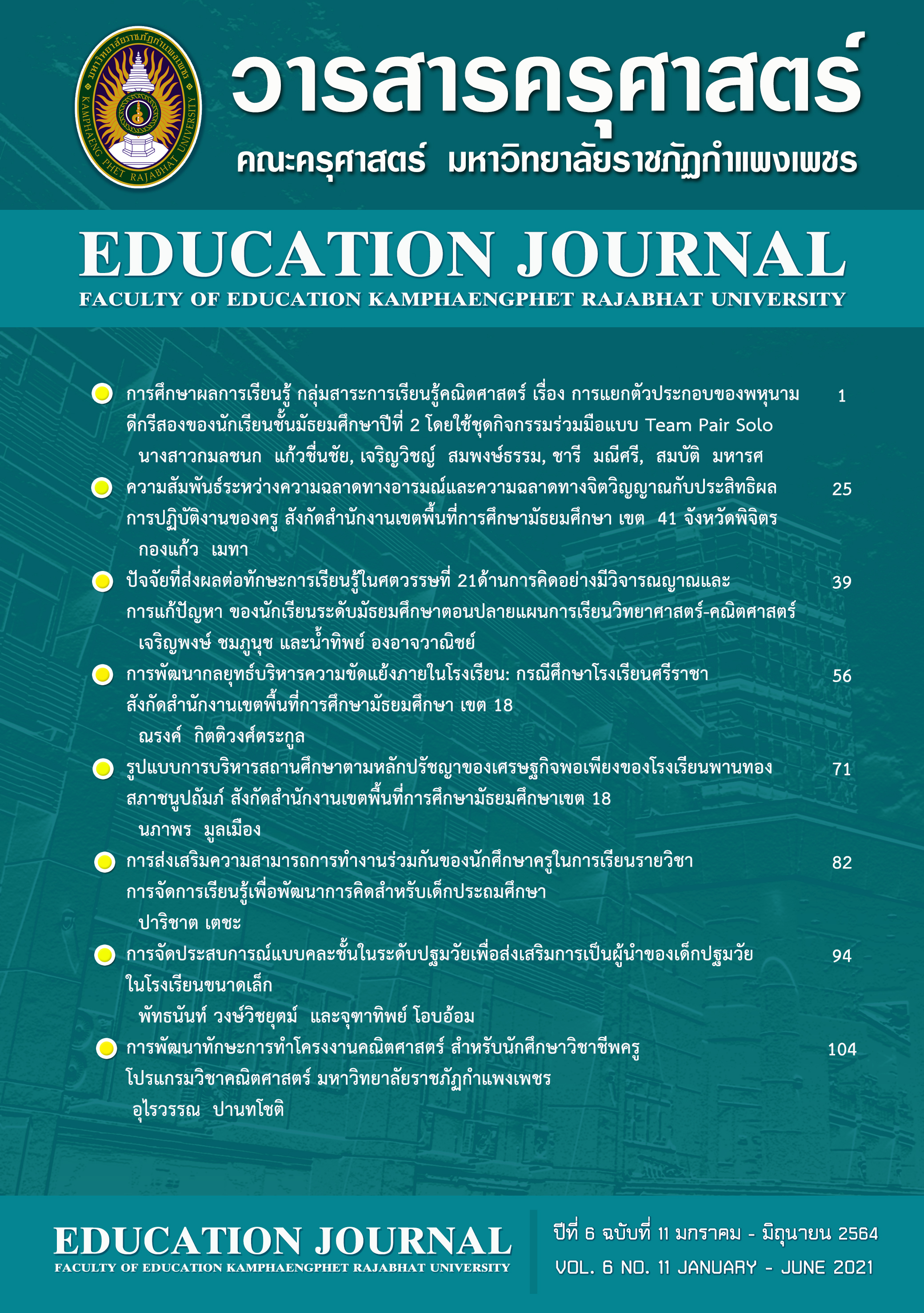THE RELATIONSHIP BETWEEN EMOTIONAL INTELLIGENCE AND SPIRITUALITY INTELLIGENCE WITH EFFECTIVENESS OF TEACHER PERFORMANCE UNDER THE SECONDARY EDUCATIONAL SERVICE AREA OFFICE 41, PHICHIT PROVINCE
Main Article Content
Abstract
The purpose of this research is 1) To study the level of emotional intelligence and spiritual intelligence with effectiveness of teacher performance under The secondary Educational Service Area Office 41, Phichit Province. 2) To study the relationship between emotional intelligence and spiritual intelligence with effectiveness of teacher performance under The secondary Educational Service Area Office 41, Phichit Province. Sample group research consisted of 248 teachers under The secondary Educational Service Area Office 41, Phichit Province. The instrument in this research used questionnaire has 5 levels rating scale. The statistics used for data analysis were percentage, mean, standard deviation and Pearson's product moment correlation coefficient. The results found as follows; 1. Emotional intelligence level overall, it was in the high level. The overall spiritual intelligence was in the high level and the effectiveness of teachers' performance at the high level 2. The relationship between emotional intelligence and effectiveness of teacher performance overall, there is a positive relationship at a moderate level with statistically significant at .01 level. Spiritual intelligence and effectiveness of teacher performance overall, there is a positive relationship at a high level with statistically significant at .01 level.
Article Details

This work is licensed under a Creative Commons Attribution-NonCommercial 4.0 International License.
CC Attribution-NonCommercial-NoDerivatives 4.0
References
กร ศิริโชควัฒนา. (2551). E.Q.บริหารอารมณ์อย่างฉลาด. พิมพ์ครั้งที่ 5. กรุงเทพฯ : ซิซินี อินเตอร์เนชั่นแนล.
กรมสุขภาพจิต. (2543). คู่มือความฉลาดทางอารมณ์. กรุงเทพฯ: โรงพิมพ์ ชุมนุมสหกรณ์การเกษตรแห่งประเทศไทย.
กระทรวงศึกษาธิการ. (2542). พระราชบัญญัติการศึกษาแห่งชาติ พ.ศ.2542 และที่แก้ไขเพิ่มเติม (ฉบับที่ 2) พ.ศ.2545. กรุงเทพฯ : โรงพิมพ์คุรุสภาลาดพร้าว.
กัณณ์ วีระกรพานิช. (2559). ปัจจัยเชิงสาเหตุของพฤติกรรมการเป็นสมาชิกที่ดีขององค์การ โดยความฉลาดทางจิตวิญญาณของบุคลากรในอุตสาหกรรมชิ้นส่วนอิเล็กทรอนิกส์เป็น ตัวแปรส่งผ่าน. วิทยานิพนธ์ ปรัชญาดุษฎีบัณฑิต สาขาวิชาจิตวิทยาอุตสาหกรรมและองค์การ ภาควิชามนุษยศาสตร์ บัณฑิตวิทยาลัย มหาวิทยาลัยเทคโนโลยีพระจอมเกล้าพระนครเหนือ.
เทอดศักดิ์ เดชคง. (2546). ความฉลาดทางอารมณ์ จากทฤษฎีสู่การปฏิบัติ. พิมพ์ครั้งที่สอง. กรุงเทพฯ : มติชน.
ธีระศักดิ์ กำบรรณารักษ์. (2551). ชนะชีวิตคิดอย่างอัจฉริยะ. กรุงเทพฯ : บิสซี่เดย์.
ไพฑูรย์ สินลารัตน์ และนักรบ หมี้แสน. (2560). ความเป็นครูและการพัฒนาครูมืออาชีพ. กรุงเทพฯ : โรงพิมพ์แห่งจุฬาลงกรณ์มหาวิทยาลัย.
ราชกิจจานุเบกษา. (2556). ข้อบังคับคุรุสภา ว่าด้วยมาตรฐานวิชาชีพ พ.ศ.2556. เล่มที่ 130 ตอนพิเศษ 130 ง วันที่ 4 ตุลาคม 2556.
วิเชียร ไชยบัง. (2562). จิตศึกษา พัฒนาภายใน. พิมพ์ครั้งที่ 7. บุรีรัมย์ : โรงเรียนลำปลายมาศพัฒนา.
วีระวัฒน์ ปันนิตามัย. (2551). เชาวน์อารมณ์ (EQ) : ดัชนีเพื่อความสุขและความสำเร็จของชีวิต. พิมพ์ครั้งที่ 7. กรุงเทพฯ : สำนักพิมพ์จุฬาลงกรณ์มหาวิทยาลัย.
สำนักงานคณะกรรมการการศึกษาขั้นพื้นฐาน. (2552). คู่มือการปฏิบัติงานข้าราชการครู. กรุงเทพฯ : สำนักงานเลขาธิการคุรุสภา.
อรุณี นิลสาระคู. (2551). การศึกษาความสัมพันธ์ความฉลาดทางอารมณ์ของผู้บริหารสถานศึกษากับผลการปฏิบัติงานของครูผู้สอนในสถานศึกษาขั้นพื้นฐาน จังหวัดบุรีรัมย์. วิทยานิพนธ์หลักสูตรครุศาสตรมหาบัณฑิต โปรแกรมวิชาการบริหารการศึกษา บัณฑิตศึกษา มหาวิทยาลัยราชภัฏสุรินทร์.
Bar-On, R. (1997). Emotional Quotient Inventory: A Measure of Emotional Intelligence. Toronto : Multi-Health System.
Emmons RA, Crumpler CA. (2000). Gratitude as human strength: Appraising the evidence. Journal of Social and Clinical Psychology.
Lam, L.T., and Kirby, S. L. (2002). “Is Emotional Intelligence and Advantage? An Exploration Of The Impact of Emotional and General Intelligence on Individual Performance”. Journal of Social Psychology.
Rashvand, Omid & Bahrevar, Elham. (2013). A Study of the Relationship among Spiritual intelligence, Organizational Citizenship Behavior and Turnover Intentions. International Journal of Research in Organizational Behavior and Human Resource Management, Vol. 1, No. 2.
Salovey, D. and Mayer, J.D. (1990). “Emotional Intelligence”. Imagination, Congnition and Personality. New York : Basic Books.


